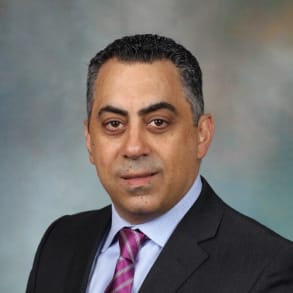Mayo Clinic physicians and researchers are not only driven to practice to today's best evidence but also help develop the best evidence of the future. Mayo Clinic colorectal cancer experts Jeremy C. Jones, M.D. , and Tanios S. Bekaii-Saab, M.D. , provide an overview of colorectal cancer clinical trials that are transforming the way this disease is treated.
We have a tremendous amount of clinical trials that are available, in fact, being at Mayo Clinic and we have three shields, one is excellence in clinical care. One is excellence in teaching, and then the third, which I think is equally important, is excellence in research. And so we all feel the, um need and drive to not only practice to the best evidence that we have today, but also to help develop what is the best evidence of the future. One of the jewels I think of our research in terms of how we're going to move the field forward is a study called Colonnade that's running through our crew research consortium. So that's a Mayo Clinic Cancer Center supported consortium. And that's essentially going to be available through 12 to 16, uh, centers across the United States including, of course, all our Mayo Clinic sites. This study, essentially, I think, is going to transform the way we treat colon cancer. The platform itself is looking to screen anywhere between two and 5000 patients over the next uh, 2 to 5 years, and it will use the principle of liquid biopsies. Essentially, we look for circulating free D N A. From the cancer, and we capture the genetic alterations from the circulating free D N A. And patients will be assigned to one of the arms, depending on what they match. What what target we find that matches the alteration on the circulating free D. N A. We have multiple arms that are present through the study that can either be referred to from the outside or through the platform itself. From her two amplification to E g f r E challenge to F G F R. Alterations to met Amplifications to be Ralf mutations e G f R. Amplification a number of other alterations that are being integrated, very dynamic platform where all these arms are common together. There is no other study like it in the United States. One study that was recently published, uh, was a study that again was run by Mayo Clinic investigators through our Mayo Clinic Cancer Center supported So Consortium called the Crew Consortium. This is a study that looked at the commonly used agent uh, radiograph and a multi kinase inhibitor that's used in more refractory colorectal cancer patients and was was a difficult agent to use. Although we knew that it improves outcomes, improved survival of patients who've seen multiple other therapies. But it had quite a bit of toxicity. And so we went back and revisited the dose scheduling. We went to a dose escalation strategy from a lower dose to hire those in the first cycle of treatment versus the standard. And we've shown essentially that going with those escalation strategy improved significantly. Uh, the outcome lessons The toxicities, uh, improves the quality of life of the patients and improve survival significantly versus versus the standard dozing. We have seen one of the most common mutations, and colon cancer occurs. About 50 to 60% of patients is a gene called care as, uh, For many, many years, this is felt to be undrinkable, meaning we could not design a drug that would block it. More recently, over the last four or five years, there have been drugs available that have started to show promise. In terms of blocking these mutations, we have not one but two trials that are ongoing now for patients who have colorectal cancer that blocks this specific mutation, and we've seen very promising results. As a fellow I was researching and looking at these types of mutations. It turns out that we had a large database, and so we were actually able to define one of these be wrapped mutations. It's quite rare. We call them non V 600 B reputations, whereas previously they were sort of being thrown around and nobody knew what they actually were and what they meant. We were able to, with our collaborative effort to define what these what? These mutations are what they mean in terms of the cancer. So, um, now, the second part of that is, uh, we have designed a trial that will be opening here soon on how do we target these mutations? I think that, uh, the next 20 or 30 years we will see dramatic improvements in colon and rectal cancer in some part by the research that we are laying the foundation for today. Yeah,


